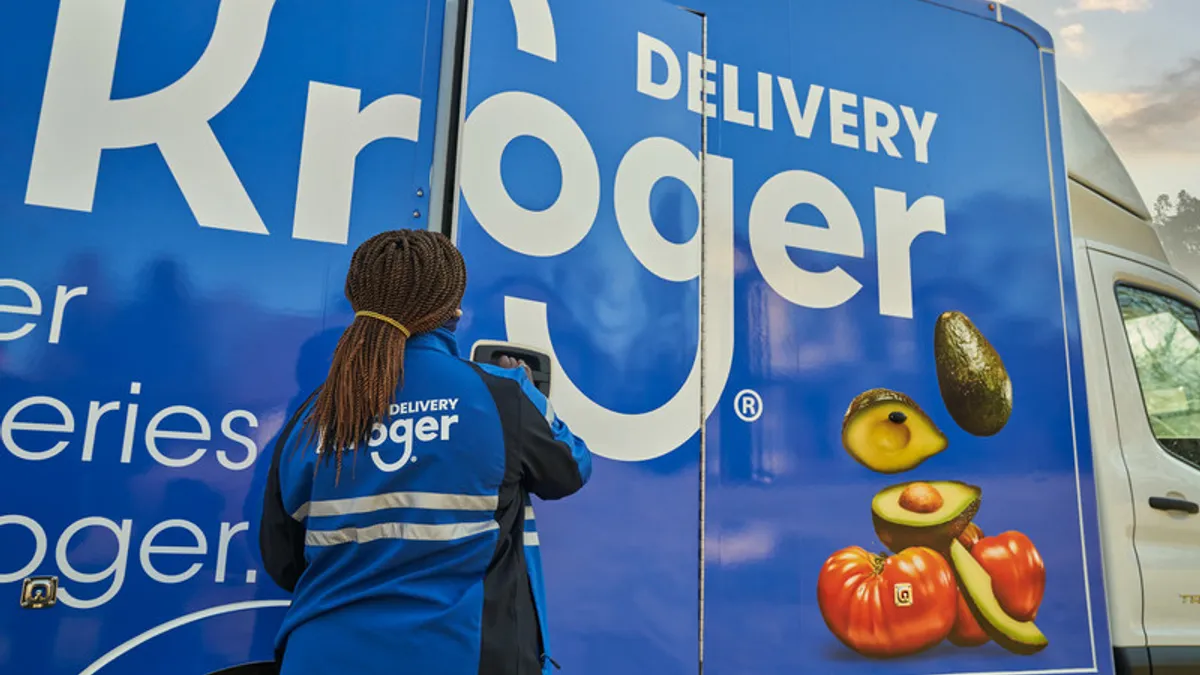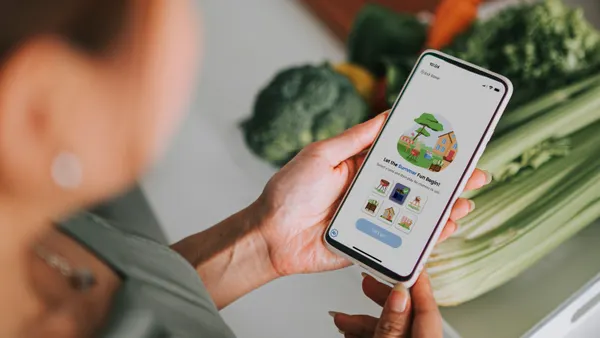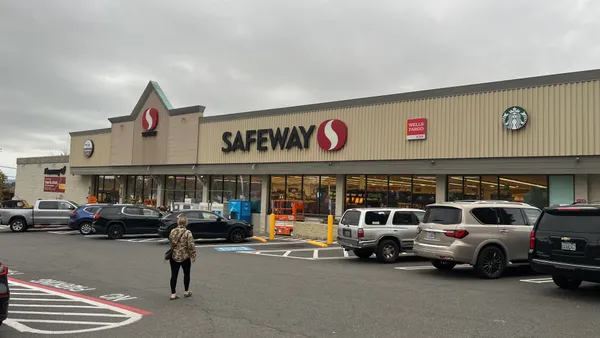Dive Brief:
- Kroger reported fourth-quarter 2022 sales and a profit outlook for the year ahead that beat Wall Street’s expectations Thursday, pushing up its stock price by more than 6% in morning trading.
- During its Q4, which ended Jan. 28, Kroger’s identical sales excluding fuel increased 6.2% while adjusted earnings per share reached 99 cents. Digital sales increased 12% while store brand identical sales grew 10.1%.
- For fiscal year 2023, Kroger forecast earnings per share to range from $4.45-$4.60, topping Wall Street’s estimate of $4.20, per Reuters.
Dive Insight:
Kroger’s strong Q4 sales coupled with a sunnier-than-expected outlook put the grocer on solid footing as it confronts ongoing consumer volatility and a prolonged negotiation with regulators over its proposed merger with Albertsons.
That outlook stood in contrast to what major retailers like Walmart, Target and Amazon, which all sell a significant amount of discretionary items, see ahead for this year, underscoring the advantages grocers have even when consumer spending is tight.
Like Walmart, Kroger has seen more interest in its offerings from higher-income consumers. In 2022, the grocer grew the number of higher-income households by 1.1 million, Kroger CEO Rodney McMullen told investors during an earnings call Thursday morning.
Kroger has used its extensive private label portfolio to its advantage. The grocer has continued to expand its product set, including launching a new value-tier line, Smart Way, in the fall.
“Our brands’ quality and value proposition [are] especially important when inflation is affecting so many of our customers’ lives,” McMullen said.
McMullen said more than 1,400 stores implemented an end-to-end produce solution last year, which helped boost both fresh and total store sales. With fresh as one of the grocer’s key focus areas, the company is looking to expand its production facilities for Home Chef, the meal kit maker it bought in 2018, to meet growing consumer demand for meal solutions, he said.
Kroger is also leveraging its digital shopping services, including its Boost membership program and new initiatives like sushi and floral delivery. Delivery sales grew 22% in Q4 over the same period last year, and Kroger increased the number of “digitally engaged households” that shop with the company by 900,000 compared to the year-ago period.
During the company’s earnings call Thursday morning, McMullen said Kroger expects digital sales growth to outpace overall food-at-home sales growth this year. “More and more customers are incorporating e-commerce into their daily permanent routine, recognizing the value and convenience online shopping offers,” he said.
Millerchip said Kroger saw its best-ever quarter for the cost to serve a digital order in Q4, noting the amount of media revenue the company is generating per digital transaction is continuing to grow, driving digital profitability.
Kroger is also continuing to build out its automated e-commerce fulfillment center network, having recently opened a 300,000-square-foot customer fulfillment center (CFC) in the Denver Metro area. Kroger is working on understanding demand, customer behavior and optimization with its initial CFCs, Millerchip said.
Nearly six months after announcing its $24.6 billion proposed acquisition of Albertsons, Kroger is “working cooperatively with regulators,” McMullen said. The company still expects the acquisition to close early next year, McMullen said, noting that Kroger launched “integration planning efforts” during the most recent quarter.
“[We are] responding to the Federal Trade Commission’s second request and in discussions about the transaction while also working to identify potential buyers for the stores we expect to divest to obtain clearance for the transaction,” McMullen said.
Last month, Reuters reported that Kroger had forwarded to regulators a plan to divest between 250 and 300 stores.
Kroger noted in its earnings statement that it has paused its share repurchase program as it prioritizes de-leveraging in the wake of its proposed merger.
During fiscal 2022, Kroger generated $148.3 billion in net sales, up 5.2% over the previous year, excluding fuel. Identical sales increased 5.6%, while adjusted earnings per share reached $4.23, up 15% over the previous year.
For the year ahead, Kroger expects capital expenditures to total between $3.4 billion and $3.6 billion.
Kroger also announced Thursday morning that it plans to make an incremental investment of $770 million in its workers this year. The company said it intends to direct the funds toward initiatives including higher average hourly wages, improved healthcare choices and new training programs.













